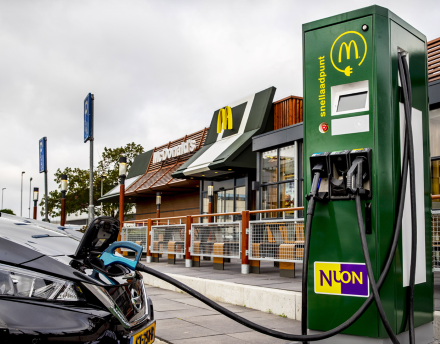Netherlands McDonald’s to have an EV charging station at every Drive-in
McDonald’s have announced their partnership with Dutch company Nuon to implement EV charging stations at their Drive-in sites in the Netherlands.

McDonald’s have announced their partnership with Dutch company Nuon to implement EV charging stations at their Drive-in sites in the Netherlands.
Nuon is an energy company who have implemented over 7,000 electric vehicle charging points across the Netherlands.
The dutch electric vehicle market is expanding and there is an increased demand for places to charge them.
The agreement is set to start at the end of 2018 with the installation of 168 charging stations at every McDonald’s in the Netherlands with a McDrive. They aim to charge an electric vehicle in half an hour powered by green electricity from Dutch windmills.
Bas Klaassen, Director Development Real Estate & Construction at McDonald's, said: "With this agreement, together with Nuon, we are taking an important step in addition to our objectives of making our restaurants more sustainable. Electric riders can get back on the road within half an hour and have the time for a good cup of coffee. The fast-charging stations run entirely on green electricity.”
Pieter van Ommeren, Director Emobility Netherlands of Nuon / Vattenfall, said: "We are extremely proud of this collaboration. Nuon and Vattenfall want to make fossil-free living possible, at home, at work and on the road. The fact that we can now combine our expertise with the scale of McDonald's gives the development of electric transport in the Netherlands a huge boost. Because to enable all Dutch people to drive electrically, a good infrastructure with sufficient and easily accessible charging points is essential. Nuon and McDonald's are taking a great step in this today.”
McDonald’s have already set out a series of sustainable targets to reduce their carbon footprint. They have introduced sustainable cups as well as reducing their greenhouse gas emissions by 36 per cent by 2030.
Photo Credit: Nuon






